- Home
- Maggie Alderson
Mad About the Boy
Mad About the Boy Read online
Penguin Books
mad about the Boy
Maggie Alderson was born in London, brought up in Staffordshire and educated at the University of St Andrews. She has worked on nine magazines – editing four of them, including British ELLE – and has been going to the international fashion shows for nearly 20 years.
Her novels Pants on Fire, Mad About the Boy, Handbags and Gladrags, Cents and Sensibility and How to Break Your Own Heart, are bestsellers in Australia and the UK, and she is a co-editor of two charity anthologies: Big Night Out, for War Child; and Girls’ Night In 4, for War Child and No Strings. She has also published three collections of non-fiction: Shoe Money, Handbag Heaven and Gravity Sucks. She is married, and has one daughter and 12 pairs of Prada shoes.
Further information about the author can be found at maggiealderson.com
MAGGIE ALDERSON
mad about the
Boy
Penguin Books
PENGUIN BOOKS
Published by the Penguin Group
Penguin Group (Australia)
250 Camberwell Road, Camberwell, Victoria 3124, Australia
(a division of Pearson Australia Group Pty Ltd)
Penguin Group (USA) Inc.
375 Hudson Street, New York, New York 10014, USA
Penguin Group (Canada)
90 Eglinton Avenue East, Suite 700, Toronto, Canada ON M4P 2Y3
(a division of Pearson Penguin Canada Inc.)
Penguin Books Ltd
80 Strand, London WC2R 0RL England
Penguin Ireland
25 St Stephen’s Green, Dublin 2, Ireland
(a division of Penguin Books Ltd)
Penguin Books India Pvt Ltd
11 Community Centre, Panchsheel Park, New Delhi – 110 017, India
Penguin Group (NZ)
67 Apollo Drive, Rosedale, North Shore 0632, New Zealand
(a division of Pearson New Zealand Ltd)
Penguin Books (South Africa) (Pty) Ltd
24 Sturdee Avenue, Rosebank, Johannesburg 2196, South Africa
Penguin Books Ltd, Registered Offices: 80 Strand, London, WC2R 0RL, England
First published by Penguin Books Australia Ltd, 2000
This edition published by Penguin Group (Australia), 2008
Text copyright © Maggie Alderson 2002
Cover illustration copyright © Elizabeth Lamb 2008
The moral right of the author has been asserted
All rights reserved. Without limiting the rights under copyright reserved above, no part of this publication may be reproduced, stored in or introduced into a retrieval system, or transmitted, in any form or by any means (electronic, mechanical, photocopying, recording or otherwise), without the prior written permission of both the copyright owner and the above publisher of this book.
penguin.com.au
ISBN: 9780857969187
This is a work of fiction. Any resemblance to real events or people, living or dead, nice or nasty, is entirely coincidental. Except for the Apollos. They were real.
For Popi
acknowledgements
To have one fabulous publisher is a blessing – to have two a miracle. Love, thanks and deep respect to (in alphabetical order) Harrie Evans at Penguin UK and Julie Gibbs at Penguin Australia. I’m mad about the girls.
Gratitude and affection in spades to all the other Penguins on both continents. I would be happy on an ice floe with any of you. Thanks especially to Marina Messiha and Elizabeth Lamb for a fab new cover.
Deep appreciation is also due to the wonderful Curtis Brownies: Jonathon Lloyd and Lucy McNicholas in London, Fiona Inglis and Tara Wynne in Sydney.
Thanks also to all my colleagues and pals at the Sydney Morning Herald, particularly Alan Revell, Robert Whitehead, Fenella Souter, Phil Scott, Anthea Loucas and Stephanie Raethel. And to Jane Wheatley and Portia Colwell at The Times.
Special thanks to all my friends for their support and inspiration, specifically Victoria Killay and Caris Davis for ‘mentionitis’ and ‘Marmite miners’, Ruby Millington for the ‘buggery’ and Paula Joye for ‘the time before Monkey’. And a big kiss to Kate Duthie, because she is the funniest, most inspiring babe I know.
1
I’ve got nothing against gay men – some of my best friends are homosexuals. I just didn’t expect my husband to be one too.
Even after he told me it took a while to sink in. We were sitting at the breakfast table one Saturday morning when Hugo suddenly put down the fashion supplement and sent our son Tom out into the garden to play. Then he said, in a perfectly normal tone of voice: ‘I’ve got something to tell you.’
Those are always ominous words, but of the nightmare options that passed through my head – I’ve been made redundant, we’re moving back to England, my parents are coming to stay – a coming out speech never figured.
I didn’t say anything, I just nodded and looked at him expectantly. Maybe we were moving to Melbourne. Cool.
‘I’m a pouf,’ he said.
It didn’t sink in at first because I already knew that. Hugo had always been a big girl and that was exactly what I loved about him. He adored fancy-dress parties, he liked choosing curtains, he cried in soppy films, he arranged flowers better than I did. Those are precisely the things that made me fall in love with him when we met, aged nineteen. My friends had always told me how lucky I was to have a husband with such ‘good taste’. A man who bought you underwear on Valentine’s Day that you’d actually want to wear.
So I just carried on looking at him, puzzled, waiting for him to tell me the big news. He sighed and raked his fingers through his hair.
‘I’m a pansy, Antonia. A woofter. A shirtlifter. A bum bandit. A turd burglar. A Marmite miner.’
I still didn’t get it. I simply couldn’t process what he was saying. Not until he leaned across the table and said:
‘I’m queer, Ant. I’ve got a boyfriend.’
Then I got it.
For a while I could only stare at him. I think for the first time in my life I understood what the word ‘shock’ actually means. It was a typically hot and humid Sydney January morning but I felt really cold. I was shaking and shivering. My mouth hung open, but I could think of nothing to say.
I stared at Hugo Xavier James Heaveringham (pronounced ‘heaver’, rhymes with beaver, don’t ask), the man I had spent the past ten years of my life with and, on the surface, nothing had changed.
He still had the wavy dark blond hair, the high cheekbones, the beautiful pale blue eyes and the expression of a constipated spaniel which I had fallen in love with when we met at our first Medieval History lecture at St Andrews University. I had never before experienced the full beam of aristocratic charm and from that first moment I was smitten. Amazingly, so was he.
Somehow the memory of that meeting flashed through my mind fully formed; at the same time I was trying to process what he had just told me. It was as though I was remembering every moment of our life together, whilst simultaneously wondering what would become of us and how we would tell Tom. Not to mention his mother, the devoutly Catholic Countess of Romsburgh, and his father, the atheist earl.
Then one of the words Hugo had mentioned in his confession came rushing back at me like a rude gesture.
‘A boyfriend?’ I spat out. ‘What kind of a boyfriend?’
In that instant, I realized that the infidelity hurt me a lot more than the gay revelation.
‘What kind of boyfriend do you think, Ant?’ he spat back. ‘A boyfriend boyfriend. He’s called Greg.’
‘Greg,’ I said in a sarcastic voice. ‘Charmed, I’m sure. Hi, I’m Greg, I’m an Aquarius. What does he do, this “Greg”?’
‘He’s a hairdresser.’
‘
Oh, how very lovely,’ I said, suddenly understanding the provenance of the rather alarming Caesar haircut Hugo had arrived home with one recent evening.
‘How long have you known this hairdresser?’ I asked, my heart beginning to pound.
‘Five months.’
I counted back to August, trying to remember if there had been any signs of anything different back then. I would have been frantically busy assembling the spring stock for my shop, I worked out, so I probably wouldn’t have noticed.
‘Where did you meet him?’ I asked, my skin beginning to prickle with anger.
Hugo looked uncomfortable. He started stirring his tea noisily in his cup, in a way that I realized had annoyed me for over ten years. Suddenly, I was furious.
‘I said – where did you meet this hideous little screamer? TELL ME!’
I was shouting. I was standing up and shouting. I never shout. I’m English. I’m a vicar’s daughter.
Hugo was standing too. He had gone all red. Not the bonnie wee laddie rosy cheeks that had so enchanted me when we met, but nasty angry red blotches. It was the physical manifestation of the evil twin side of Hugo’s nature, which rarely came out, but was fearsome when it did.
‘He’s not a screamer,’ he hissed. ‘He’s wonderful. I met him in Brisbane. In a bar.’
I remembered now. He’d gone up to Brisbane to see a client and he’d ended up staying nearly a week. I could clearly remember the phone call saying he had to stay the weekend. The art collection had been ‘much bigger than expected’. Right.
I had just thrown my teacup across the table at him, when Tom came back through the garden door. I saw him look quickly at us both, as the cup crashed onto the slate floor.
‘Mummy?’ he said, his little face crumpling up with confusion. Hugo and I never argued.
I scooped him up and kissed his little pink Heaveringham cheeks.
‘Don’t worry, Tom Tom,’ I said, ‘Daddy and I are just being silly. It’s just a silly game.’
‘Can I break a cup?’ he asked, always one to grab the main chance. Just like his father.
I buried my face in his soft neck, blowing raspberries on it and probably getting more comfort from the embrace than he was.
‘No, you can’t break a cup, but guess what, Tomety?’ I told him. ‘Daddy’s just told me he’s going to take you to the park, haven’t you, Daddy?’ I turned and glared at Hugo, daring him to contradict me. ‘And then perhaps you can go over to Nat’s house for the afternoon. How would that be? You can play on their beach. I’m just going to ring his mummy.’
‘Yes, I can take my noodle,’ said Tom, wriggling from my arms. ‘I’m going to wear my swimmers under my shorts and take my spade and my backpack and my beach hat and …’
He ran upstairs making a verbal list on the way. Tom loved to be organized. Not something he inherited from Hugo’s side. The most famous Heaveringham was the one who had lost Wellington’s despatches at Waterloo, somehow changing the outcome of the battle – for the better. As the Earl was fond of saying, the Heaveringhams were a bit hopeless, but they were damned lucky.
I looked back at Hugo.
‘I’m going to need some time to absorb this,’ I said, trying to control an insistent quiver in my voice. He came round the table towards me and I could see he was going to give me a hug. A hug-o, as I used to call them. I put my hand out to stop him.
‘No, Hugo,’ I said, shaking my head firmly. ‘I don’t want your hugs just at the moment. I want you to take Tom and get out, so I can have some time to think. I’ll call you and let you know when you can come back and we’ll talk some more. Right now, I can’t take anything else in.’
Eventually, after the usual pantomime with the lost wallet, mobile phone, sunglasses and car keys, Hugo and Tom made a noisy and encumbered exit and I sat at the kitchen table gazing into space.
Nursing a cold cup of tea – Hugo’s favourite teacup, I realized with a jolt, the lily of the valley pattern we’d found at a roadside market in the Blue Mountains – I tried to think and not to think at the same time.
I would forget about it all for a split second and then it would come rushing back again. It was like being one of those people with memory loss who can read the same comic strip over and over again and still find it funny. Each time I remembered it, what Hugo had just told me hit me afresh.
How could he be gay? We had a perfect marriage. We were a perfect couple. Everyone told me that and we’d been in a list of Perfect Couples in Pratler magazine, with a picture, so it must be true. And all the time he was secretly gay?
I still felt queasy from the shock and decided some toast would settle my stomach. After four pieces with peanut butter, four with apricot jam and two with Marmite, brought back from home specially, I felt a little better. Ready for some porridge and golden syrup. And some cocoa.
*
At that point – G Day, as I came to think of it – we had lived in Sydney for just over a year. Hugo was the managing director of the Australian branch of Cadogan’s, one of London’s most prestigious fine art auctioneers. He’d been head of the decorative arts department in London and the Sydney job was a major promotion – the Cadogan’s equivalent of a Foreign Office Peking posting (the other profession youngest son Hugo had been considering when we left university).
I’d been quite happy to move to Sydney, thinking it would be a nice sunny place for Tom to run around for his remaining primary school years, before he was banished off to a terrifying public school like all other male Heaveringhams before him. And it was a great promotion for Hugo – still only thirty.
It was also a relief to be several thousand miles away from Hugo’s parents. Charming though she was, Margot – the Countess of Romsburgh, Lady Heaveringham – had never quite come to terms with her darling youngest marrying ‘a parson’s daughter’, as I once heard her refer to me, and although he was a dear old thing, I did find the Earl – Freddie – rather alarming. He was so, well, mad.
His great passion was preserving the heritage of English folk music and the most frightful beardy weirdies would turn up at dinner, drinking real ale throughout and singing sea shanties, which Freddie recorded on an ancient reel to reel, conducting with his pudding spoon.
Lady H – ‘do call me Margot’ – was always witheringly charming to them.
‘Oh, you’re a heating engineer,’ she’d say, her eyes practically closing with boredom. ‘How terribly fascinating. You must meet some very interesting people. More pork?’
Hugo and his hearty siblings didn’t seem to notice any of it. Too busy getting their share of the hideous food down the front of their holey jumpers and sneaking scraps to the dogs.
While I found his family a bit much, once I had got over the initial naïve thrill of them being full-on thousand-year-family-tree aristos, I was terribly happy with Hugo. What can I say? From the moment we met, we were best buddies.
He had sat down next to me, a flushed and hectic heap, just as the first lecture of our four-year university career was about to begin, all long legs, scuffed brogues and pink cheeks, with a smile as open and irresistible as a toddler’s.
He hadn’t had a pen or any paper with him and in the last moments before the lecture started, he’d managed to tease me endearingly about my babyish pencil case full of sharp new pencils and smart rubbers, my new pad of lined A4 and my shiny red folder, whilst simultaneously relieving me of everything he needed.
Afterwards he’d bought me a cup of coffee to thank me for my stationery supplies – indescribably awful coffee in a funny little student café in the basement of the Medieval History department.
‘Reckon Pope Pius III ground this coffee himself, don’t you, Antonia?’ I remember him saying, as he peered into his cup, stirring noisily, then twinkling those ice blue eyes back up at me.
I was lost, hopelessly instantly in love, and I bought him a Wagon Wheel to take the nasty taste away. He was not used to being ‘mothered’ in that way – Lady Heaveringham had enjoyed h
er children at the hygienic remove of several nannies and a separate wing – and I didn’t realize how much such a tiny gesture could touch him.
By our second term, we were living together. We’d both started off in single-sex halls of residence – Hugo in Sallies with all the other Old Etonians, me in Chatham with all the other old virgins – but after Hugo was caught creeping out of my bedroom for the third time by the fierce lady warden, he announced he was going to find us a place of our own.
Not that we were having sex, or anything. I was still practically a virgin. The very sheltered daughter of a country vicar, I had blown the notion of sexual congress up into being some kind of holy sacrament, not something you did on a Friday night just because you felt like it. I didn’t mind snogging and all that, but the actual act overawed me. I wanted it to be ‘special’ before I would risk it.
The great thing was that unlike my previous boyfriends – a couple of boys snogged at school dances, a Yugoslavian ski instructor and a hunky American I met doing my year out stint at a children’s summer camp in Colorado – Hugo didn’t mind. (Oh all right, I did actually lose my virginity to the American, because I’d thought I was in love with him, but I was in denial about it. It had only taken about three seconds, it had hurt and then I’d found out about his ‘steady’ girlfriend, so I’d decided it didn’t count.)
Unlike them, Hugo said he was happy just ‘to cuddle’ and we would lie in bed for hours on the grey afternoons of a Scottish winter, when we should have been at lectures, giggling and singing and playing silly games, until we fell asleep in each other’s arms. I thought this was as good as life could possibly get. And you know what? It wasn’t half bad.
Using his labyrinthine network of family and old school ties, which meant that he seemed to know, or be related to, half the university from day one – or the ones who mattered, at least – Hugo quickly found us a room in a glorious old grey-stone Georgian house on South Street. A school friend of his was moving out to live with his girlfriend, so we moved in.

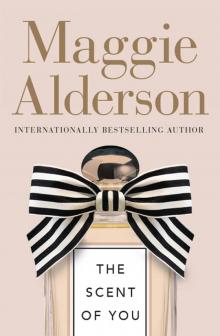 The Scent of You
The Scent of You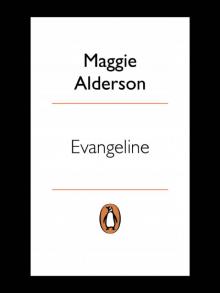 Evangeline Wish Keeper's Helper
Evangeline Wish Keeper's Helper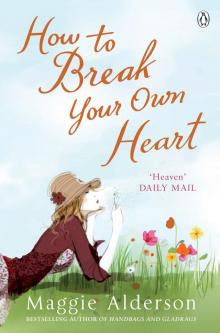 How to Break Your Own Heart
How to Break Your Own Heart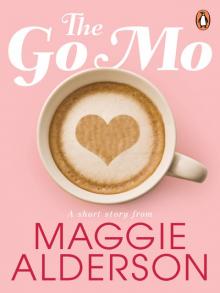 The GoMo
The GoMo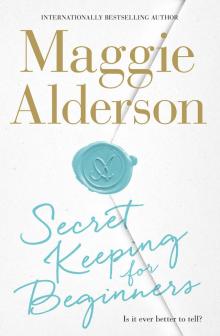 Secret Keeping for Beginners
Secret Keeping for Beginners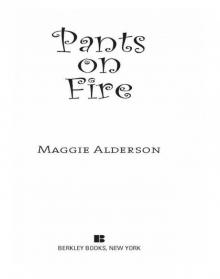 Pants on Fire
Pants on Fire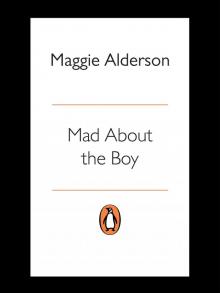 Mad About the Boy
Mad About the Boy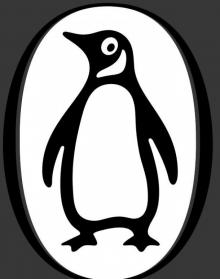 Handbags and Gladrags
Handbags and Gladrags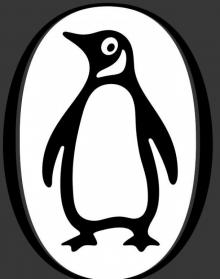 Cents and Sensibility
Cents and Sensibility